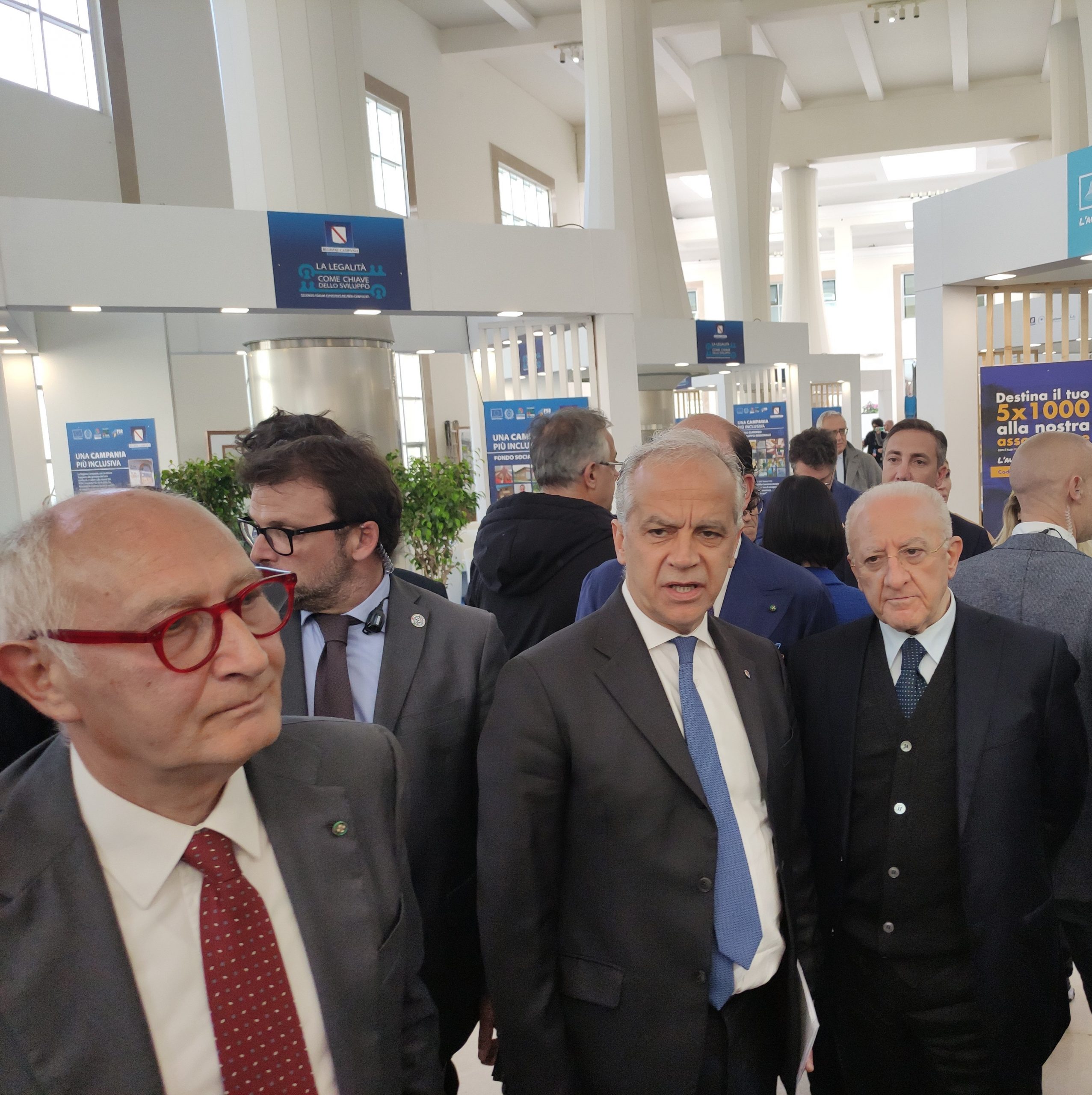The second edition of the Confiscated Assets Forum took place in Naples (21-22 April 2023). For two days, the Campania Region, through the Department of Legality, Security and Immigration, as part of the LOC (Organised Law in Campania) project managed by Sviluppo Campania, gathered at the maritime station the various souls of the Anti-Mafia, linked to the world of confiscated assets, to give rise to a two-day debate on the theme of ‘Legality as a key to Development’. Lots of discussion panels (Here the complete program) which addressed, inter alia, the fate of confiscated structures and their management, the regulatory environment, possible financial support instruments, training needs, the role of the third sector and the business community.
The Forum hosted a large exhibition section where cooperatives active in confiscated assets showed their products and activities; parades and tastings.
The first day opened with a conference that re-proposed the central theme of the two days. At the meeting, the President of the Campania Region, Vincenzo De Luca He made two proposals. The first relates to a change in the mission of the Agency for the Administration and Destination of Assets Seized and Confiscated from Crime, which, according to De Luca, should have the role that the Cassa del Mezzogiorno had, to restructure the assets and then give them to healthy business entities able to do business by freeing themselves from bureaucratic tangles. Here is the second proposal: entrust the management of assets to realities that operate on the market and that can create development and wealth. The Minister of the Interior also made a pass on the National Agency. Matteo Piantedosi, who, after recalling the meeting he had held at the Prefecture of Caserta, for the inter-institutional procedure which led to the delivery to the Campania Region of the Ferrandella compendium, announced new recruitments to strengthen the national structure dealing with Assets seized and confiscated from crime.
Recruitment which, according to Carlo Borgomeo, President of the Foundation with the South, should be done directly by the Agency and not through secondment from other bodies. Borgomeo also criticised the procedures for the call for tenders, which awarded EUR 300 million, and the National Recovery and Resilience Plan, for the restructuring of confiscated assets, pointing out that without investment in management, the problem of using confiscated assets would not be solved. The first day also allowed a discussion on the role of the Regions in which councillors and representatives of the regions of Tuscany, Emilia Romagna, Sicily, Lombardy and Veneto participated. The President of the Conference of the Regions took the floor. Maximilian Fedriga (disambiguation), President of Friuli Venezia Giulia. Fedriga called on the Regions ‘to implement plans to encourage the use of the Goods’, without reducing themselves to being mere financiers of choices made elsewhere. On the need to support smaller bodies, the Campania Regional Councillor for Legal Affairs also said: Mario Morcone, He referred to the experience of the Campania Region within the Agrorinasce Consortium.
The topics covered in the second day The forum was debated at three points.
In first panel Anti-mafia legislation and prevention measures were discussed, outlining the state of the art and the challenges ahead.
Bruno Corda, Director of the National Agency for the Administration and Destination of Confiscated Assets, stressed the importance of this tool, which weakens the ‘economic holdings’ of crime and at the same time offers the territories a chance to redeem themselves not only in terms of productivity but above all moral, creating a virtuous circle that returns to citizens the opportunities that the underworld takes away with its actions. With regard to anti-mafia legislation, Corda spoke of a set of laws that works effectively and is imitated by other countries. A system that must, however, adapt to the times and allow those involved in confiscation to have at their disposal a greater speed of action and a leaner bureaucracy. Regarding the future of companies that are born from confiscated assets Corda has specified that the success of those who invest in a territory where the underworld is still alive and present depends on how much the actors who have dealt with the previous phases of confiscation and the launch of new businesses continue to support them, involving citizenship and eradicating, especially in young people, the shadowy and criminal mentality.
At the heart of the debate in second panel, the organisation and management of confiscated property and the economic value it represents for the territory.
Mario Mustilli (disambiguation), President of Sviluppo Campania, stated that the economic and social value of confiscation is infinitely higher than its own numbers for what the birth of new productive enterprises represents for the local economy. The revival of a good in the legal economy – said Mustilli – shows that the law is working and produces effects that make the economy grow for the benefit of the whole community. However, there are also discrepancies between the various parties that operate in the phases ranging from the actual confiscation to the refunctionalization and then to the launch of the asset as an economic and productive reality. The banking system, for example, should review the rules for the support that young structures that arise from confiscated assets need. According to Mustilli, professional figures are also needed to act as a link for all those who in various ways work before and after confiscation. The training course offered by Sviluppo Campania, for the role of judicial guardian, which with its skills facilitates and speeds up the process of recovering, managing and relaunching assets, is an important tool to make the use of the assets themselves truly effective. Mustilli then illustrated the role of Sviluppo Campania in the study and offer of new financial instruments at the service of companies that arise from confiscation, to make them truly competitive on the market in which they appear.
In Third Panel the conclusions of the proceedings have been drawn.
The Regional Councillor for Legality, Mario Morcone, spoke of a slap in the face of the underworld every time an asset is taken away from him and offered to the territory to create structures that were lacking; structures that operate in the social field, companies and cooperatives that with their work participate in the revitalization of the territories. Morcone reiterated his opposition to the establishment of a public economic entity for the management of confiscated assets because the new realities that come to life after confiscation must operate on the territory and with the territory according to the dictates of the Rognoni-La Torre law. In this sense, the role of the Region is fundamental as a link between municipalities, associations, cooperatives and citizens.
Finished the work Wanda Iron, State Secretary at the Ministry of the Interior, who spoke of two days of discussion but above all of evaluation on what has been done but even more on the challenges ahead. The most important issues to be discussed were, in his opinion, the collaboration between the various actors who manage the confiscation and the future of confiscated assets. “Positive experiences should also be told in order to motivate public opinion and demonstrate that legality can win.” Undersecretary Ferro considers the legislation governing the confiscation of assets adequate, solid and with roots that start from afar, for example from the experience of Falcone and Borsellino, but at the same time the legislative system must be up to new challenges, especially speeding up the time of action to allow the complex machine that deals with the confiscation of assets to work perfectly.




